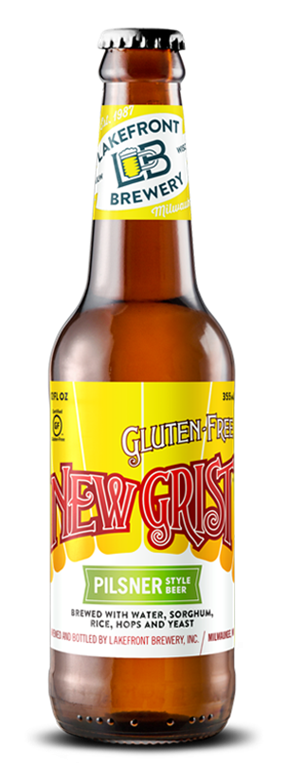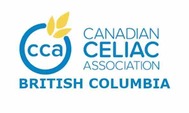Interview with Ashok Fogla, CEO AFIC Group & distributor for Lakefront Breweries – maker of New Grist – By Val Vaartnou, March, 2018
Ashok Fogla is a distributor of New Grist beer and owner of the AFIC group. Ashok is not celiac and does not have anyone in his family who is celiac, but has learned how life changing requiring “gluten-free” can be. Distributing gluten-free beer is not an easy business, as can be seen by the number of gluten-free companies that are having difficulties surviving. He originally distributed Bardsdale beer in Alberta and was approached by Lakefront Brewery Inc. to take on the first gluten-free beer in North America – New Grist.
Lakefront Brewery, Inc. is a brewery in Milwaukee, Wisconsin, United States. The brewery is based in the Beerline B neighborhood of Milwaukee, Wisconsin. Founded in 1987 by brothers Russ and Jim Klisch, several of its brands are named after Milwaukee neighborhoods, such as Riverwest Stein Beer and East Side Dark. The brewery was the first in the U.S. to bottle fruit beer since prohibition was repealed, starting in 1992 with the seasonal Lakefront Cherry Lager. The brewery often uses Wisconsin-grown ingredients, including Door County cherries.
The brewery produced the first certified organic beer to be bottled in the U.S. starting in 1996 with their Lakefront Organic E.S.B. (extra special bitter). In May 2007, The Wisconsin Department of Tourism announced that Lakefront Brewery had become the first brewery in the state and the first business in the City of Milwaukee to receive the Travel Green Wisconsin certification. Travel Green Wisconsin recognizes tourism-related businesses that are reducing their environmental impact through operational and other improvements. To achieve Travel Green certification, businesses must meet several goals including demonstration of how they encourage staff and vendors to be environmentally aware and how they reduce their waste and energy consumption.
The brewery is noted for its gluten-free brand, New Grist, which is brewed using sorghum, rice and gluten-free yeast (grown on molasses). While tending to personal and professional business in Milwaukee, a doctor from Houston found Lakefront Brewery in the local literature and was duly impressed that this microbrewery had obtained certification in organic brewing. He placed a call to the Klisch brothers, asking that they create a gluten-free beer for himself and the thousands of celiacs across the country living under the constraints of restricted diets, unable to enjoy their beverage of choice.
As luck would have it, the doctor’s nephew happened to be a past roommate of owner Russ Klisch during his college years, immediately establishing an unspoken bond between the doctor and the brewers. The following week, a woman called inquiring whether they made a gluten-free beer. The agenda was set. There was no turning back. (http://www.bellaonline.com/articles/art37867.asp Carolyn Smagalski)
Not content to rest on their laurels, Russ and Jim, and their brewmaster for the past seven years, Luther Paul, are innovators. “Luther’s dad has Celiac Disease,” so there was an additional incentive to produce gluten-free beer. After brewing two batches of New Grist Barley-Free Beer, Lakefront presented their new brew to a local Celiac Group who enthusiastically evaluated the new recipe for appearance, aroma, flavor, mouthfeel and overall impression. A few recommendations for slight adjustments followed, and the new suds were ready for distribution.
The brewery successfully petitioned the U.S. Alcohol and Tobacco Tax and Trade Bureau to allow this product to be called a beer despite not having the previously required 25% malted barley content, thus creating the first gluten-free beer in America.
Growth of the brewery has been strong in recent years, especially due to the gluten-free product. Lakefront Brewery uses a dedicated line for brewing the gluten-free beer. Each batch of the beer is sent to the U of Nebraska where it is tested for the gluten content in the beer. New Grist is not a gluten reduced beer but is gluten-free so is entirely safe for celiacs.
Gluten-free beer has additional challenges to the production of other beers. The sorghum ingredients are more expensive than barley or wheat malt and the process of keeping the line cleaned and sanitized and testing each batch for gluten content also makes it more expensive to produce. The added costs increase the retail price and this can prove a challenge to get the limited shelf space at liquor stores. The stores often chose only one type of gluten-free beer for their stores.
In BC, New Grist can be found in 140 of the approximately 200 government liquor stores. Although there are over 600 private liquor stores, New Grist is found in about 100 of them. Each store must be sold to directly and each restaurant choses which beers they will offer to the public. This adds to the costs of distribution. Lakefront however continues to ensure quality and consistently monitors to ensure its product on store shelves is always fresh from the brewery.
The gluten-free business actually peaked due to the “GF fad” between 2010 and 2015. Slowly the “fad” has subsided and those buying the beer are now those who need it due to medical reasons: celiacs and those who are gluten sensitive. The industry is shaking out and the number of companies producing gluten-free beer has been reduced. Lakefront produces other beers as well, so they are more resilient. They are committed to making the beer.
New Grist is optimistic that business will grow in the future despite being down from its peak at the start of this decade. They are experimenting with new styles of beer, possibly fruit infused, pale ale or IPA style.
The product line for Lakefront Brewery is part of an established distribution system, allowing New Grist to be distributed through the same distribution lines and giving celiacs access to this new beer through a wide variety of commercial channels.
I enjoy a cold beer on a hot day but particularly enjoy a michelada, one of the most popular drinks in Mexico. It is a beer-based cocktail made with lime, hot sauce, Worcestershire (gluten-free of course), and often tomato (or Clamato) juice, all served over ice in a glass with a salted rim (or not.) I also use the gluten-free beer to make a beer batter for fish and chips. Being celiac does not mean you have to do without!
Lakefront Brewery, Inc. is a brewery in Milwaukee, Wisconsin, United States. The brewery is based in the Beerline B neighborhood of Milwaukee, Wisconsin. Founded in 1987 by brothers Russ and Jim Klisch, several of its brands are named after Milwaukee neighborhoods, such as Riverwest Stein Beer and East Side Dark. The brewery was the first in the U.S. to bottle fruit beer since prohibition was repealed, starting in 1992 with the seasonal Lakefront Cherry Lager. The brewery often uses Wisconsin-grown ingredients, including Door County cherries.
The brewery produced the first certified organic beer to be bottled in the U.S. starting in 1996 with their Lakefront Organic E.S.B. (extra special bitter). In May 2007, The Wisconsin Department of Tourism announced that Lakefront Brewery had become the first brewery in the state and the first business in the City of Milwaukee to receive the Travel Green Wisconsin certification. Travel Green Wisconsin recognizes tourism-related businesses that are reducing their environmental impact through operational and other improvements. To achieve Travel Green certification, businesses must meet several goals including demonstration of how they encourage staff and vendors to be environmentally aware and how they reduce their waste and energy consumption.
The brewery is noted for its gluten-free brand, New Grist, which is brewed using sorghum, rice and gluten-free yeast (grown on molasses). While tending to personal and professional business in Milwaukee, a doctor from Houston found Lakefront Brewery in the local literature and was duly impressed that this microbrewery had obtained certification in organic brewing. He placed a call to the Klisch brothers, asking that they create a gluten-free beer for himself and the thousands of celiacs across the country living under the constraints of restricted diets, unable to enjoy their beverage of choice.
As luck would have it, the doctor’s nephew happened to be a past roommate of owner Russ Klisch during his college years, immediately establishing an unspoken bond between the doctor and the brewers. The following week, a woman called inquiring whether they made a gluten-free beer. The agenda was set. There was no turning back. (http://www.bellaonline.com/articles/art37867.asp Carolyn Smagalski)
Not content to rest on their laurels, Russ and Jim, and their brewmaster for the past seven years, Luther Paul, are innovators. “Luther’s dad has Celiac Disease,” so there was an additional incentive to produce gluten-free beer. After brewing two batches of New Grist Barley-Free Beer, Lakefront presented their new brew to a local Celiac Group who enthusiastically evaluated the new recipe for appearance, aroma, flavor, mouthfeel and overall impression. A few recommendations for slight adjustments followed, and the new suds were ready for distribution.
The brewery successfully petitioned the U.S. Alcohol and Tobacco Tax and Trade Bureau to allow this product to be called a beer despite not having the previously required 25% malted barley content, thus creating the first gluten-free beer in America.
Growth of the brewery has been strong in recent years, especially due to the gluten-free product. Lakefront Brewery uses a dedicated line for brewing the gluten-free beer. Each batch of the beer is sent to the U of Nebraska where it is tested for the gluten content in the beer. New Grist is not a gluten reduced beer but is gluten-free so is entirely safe for celiacs.
Gluten-free beer has additional challenges to the production of other beers. The sorghum ingredients are more expensive than barley or wheat malt and the process of keeping the line cleaned and sanitized and testing each batch for gluten content also makes it more expensive to produce. The added costs increase the retail price and this can prove a challenge to get the limited shelf space at liquor stores. The stores often chose only one type of gluten-free beer for their stores.
In BC, New Grist can be found in 140 of the approximately 200 government liquor stores. Although there are over 600 private liquor stores, New Grist is found in about 100 of them. Each store must be sold to directly and each restaurant choses which beers they will offer to the public. This adds to the costs of distribution. Lakefront however continues to ensure quality and consistently monitors to ensure its product on store shelves is always fresh from the brewery.
The gluten-free business actually peaked due to the “GF fad” between 2010 and 2015. Slowly the “fad” has subsided and those buying the beer are now those who need it due to medical reasons: celiacs and those who are gluten sensitive. The industry is shaking out and the number of companies producing gluten-free beer has been reduced. Lakefront produces other beers as well, so they are more resilient. They are committed to making the beer.
New Grist is optimistic that business will grow in the future despite being down from its peak at the start of this decade. They are experimenting with new styles of beer, possibly fruit infused, pale ale or IPA style.
The product line for Lakefront Brewery is part of an established distribution system, allowing New Grist to be distributed through the same distribution lines and giving celiacs access to this new beer through a wide variety of commercial channels.
I enjoy a cold beer on a hot day but particularly enjoy a michelada, one of the most popular drinks in Mexico. It is a beer-based cocktail made with lime, hot sauce, Worcestershire (gluten-free of course), and often tomato (or Clamato) juice, all served over ice in a glass with a salted rim (or not.) I also use the gluten-free beer to make a beer batter for fish and chips. Being celiac does not mean you have to do without!


